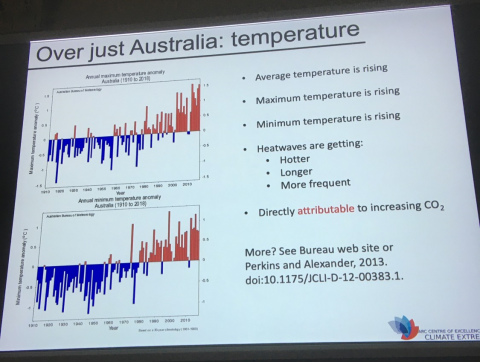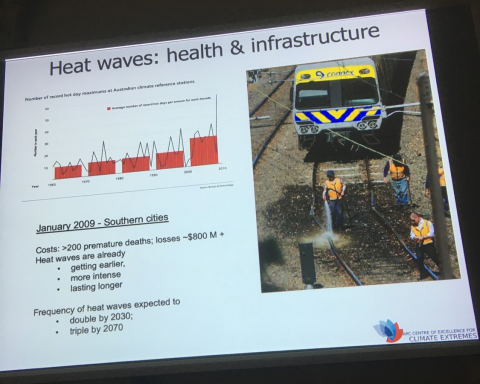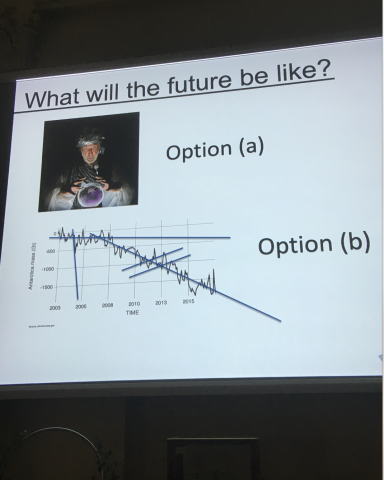
Commissioner for Environmental Sustainability, Dr Gillian Sparkes presented the Royal Society of Victoria’s RSV 2019 Medal for Excellence in Scientific Research to Professor Andrew Pitman AO, Director of the ARC Centre of Excellence for Climate Extremes for his work in the Earth Sciences (CLEx). “Andy is a highly decorated scientist including NSW Climate Scientist of the year in 2010 and in January this year was awarded an Order of Australia for distinguished service to science as a leading researcher, particularly of climate systems and the environment,” said Dr Sparkes, who presented the medal to Andy after his public lecture Climate Extremes: Present and Future at RSV headquarters in Melbourne last night. “Andy’s lecture and ethos around the value of investment in science and predictive capabilities as key for a prosperous future, leaves me with renewed hope in our abilities to deal with climate change. It was a fitting way for me to close out the year talking about the biggest issue facing the planet, and the essential role that science will play in finding solutions for the environment, the economy and society.”

In its 60th year, the RSV Medal for Excellence in Scientific Research is also an acknowledgement of Pitman’s outstanding leadership of CLEx. The Centre works to understand the behaviour of climate extremes, such as heatwaves, cold snaps, extreme rainfall, cyclones and drought, and how these directly affect Australian natural and economic systems.
“It was a real honour to present the RSV medal to such an eminent climate scientist", says Dr Sparkes. “Andy is absolutely passionate about his work. He has been persistently working away to understand climate change and to develop advice and strategies on how to prepare and respond to climate extremes."
Pitman’s lecture on climate extremes was rich in data, insights and his signature humour.
Climate Science Needs Just Four Things
For Pitman, climate science requires four things:
- Serious computing
- Data science
- Outstanding technical people
- Outstanding scientists
He briefed attendees on what we know about climate extremes and how they are changing; what is known about future extremes via modelling and what is being done to address weaknesses. He discussed the relationship between the increase in greenhouse gases and how these increases add two watts per square metre to the earth’s energy balance. “This two watts per square metre must go somewhere,” he said, sharing data on global temperature increases (up 1.1 degree Celsius since 1880 and global sea levels up 3.3 metres since 1993). “We can’t ignore that extra energy. That energy adheres to the law of physics and it must do work as we are thoroughly and unambiguously connected to the earth’s system,” he said.
In the Australian context this means higher temperatures and hotter, longer and more frequent heatwaves which is directly attributable to increasing carbon dioxide levels. “Whatever newspaper you might read, whatever TV station you watch, or radio station you listen to, it is still getting hotter,” he said.
Pitman highlighted the importance of data and how predictive analysis will be vital in how we deal with the environmental, social, political and economic (including productivity) aspects of the impact of climate extremes. The right data will support decision makers to plan for health and infrastructure services during emergencies such as heatwaves, which are predicted to double by 2030 and triple by 2070.
Investment in the right data, models and 'serious computing' will also more effectively help us predict how long these events will last for and how we can best adapt and respond. If we invest enough in our science and analysis we will be able to more accurately predict the end of the drought, for example, and allocate resources appropriately.

Pitman also talked in detail about the importance of 'attribution science', that is science that helps us understand and predict what effects we can attribute to what cause. Understanding climate extremes is not just an environmental issue, is it an economic, business and productivity issue. Says Dr Sparkes: “Andy explained that tackling climate extremes is not necessarily about fixating on the global mean temperatures, it is about understanding how that temperature is expressed, what work that extra energy is going to do and how we need to prepare and respond to events such as droughts, floods, heatwaves and fires. The issue for us is, what are we going to do about it?”

Andy’s lecture, his research and understanding of climate extremes supports the Commissioner’s recommendations in the SoE 2018 Report, for example Recommendations 2 & 18.
Despite the gravity of the subject of climate extremes, Andy’s lecture was delivered with great humour. He asked whether a crystal ball or predictive analysis will be more useful to deal with climate extremes.
Indeed.

To find out more, visit https://rsv.org.au/rsvmedal-2019/
